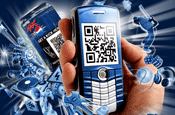
Promotionally speaking, the new frontier, now online has been tamed, is mobile technology. Mobile couponing via SMS has been around for a while, but that market has been transitory for some time, and the practice is already looking old hat.
The latest technology is QR (quick response) codes, which were developed in the advanced Japanese market. The Sun newspaper recently ran a successful trial (see case study) of using coded graphics that link consumers directly to mobile sites when scanned by a handset's camera.
And now Pepsi has launched the first mass-market application of QR codes in the UK by printing the numbers on 400 million cans. Once consumers download the QR software onto their handsets, they can scan the QR code printed on their cans. This is then sent and processed automatically to enable them to receive a range of mobile content including downloads, films and ringtones.
Another brand to use them is Harrods, which in May placed QR codes linking to its mobile website within print and online ads for its Design Icons campaign. Simon Mansell, managing director of digital marketing agency TBG London, which created the campaign, says the response was low, as expected, but the technology was used to target a specific audience. "The brief was to add an appearance of cool to the brand and engage a younger audience," Mansell explains.
The use of QR codes illustrates a determination by marketers to harness the potential of mobile marketing. In September, Pot Noodle launched an on-pack promotion offering its consumers the chance to win, or buy, one of 500,000 rotating forks (P&I, September 2008). The promotion ran across a number of channels, but a mobile website was used for the first time. The experiment worked, with 4,000 consumers participating via a mobile site.
The response surprised Pot Noodle brand manager Cheryl Calverley, who now predicts that mobile phone promotions will become increasingly popular over the next five years. "I expect to see their use equal that of online promotions," she says.
Mobile gets lapped up
AKQA was the agency behind Pot Noodle's 'dot mobi' site for the rotating fork promotion. Dan Rosen, head of AKQA Mobile, believes the sales promotion industry is on the cusp of a mobile revolution. "There are three mobile phones in the world for every PC," he says. "It is not a question of if, but when mobile vouchering will explode."
Another brand testing the water is furniture retailer Harveys, which recently integrated a mobile vouchering system into its sponsorship of Coronation Street. Viewers with digital TV were able to access an interactive page, which asked them to text in for a short code that would give them a 15 per cent discount in-store. During a 13-day trial in February, 30 per cent of viewers who requested a mobile voucher went on to redeem it.
Meanwhile, M&S has used agency Incentivated to create short codes linking to a mobile site for its Back to School range. And London bar chain Corney & Barrow has used Eagle Eye Technology for its Buy Me A Beer campaign, where drinkers choose a tipple online and enter the mobile number of a friend, who is then sent an SMS voucher that can be redeemed at tills.
Elsewhere, Nokia is set to launch Point & Find capability in the UK in November. Put simply, the function enables users to point their phone camera at, say, a movie poster, in order to receive links to the trailer, the opportunity to buy tickets and get directions to the nearest cinema.
All of this activity mirrors the initial drive by the promotions industry to use SMS on text to win campaigns in 2001 before moving onto short codes (the five-digit numbers that appear on-pack) and then mobile coupons. Once consumers become familiar with innovations such as dot mobi sites and QR codes, there is no reason they should not become as integral as online is now.
Of course, all this is dependent on people actually downloading the technology to their phones or buying a new mobile with inbuilt capability - and then using it.
However, with the lower overheads involved and 84 per cent of the UK population owning a mobile phone, many more brands could be looking to move into this relatively untouched territory.
CASE STUDY - THE SUN
Last December, The Sun launched a dedicated QR supplement to promote the technology in the UK and trial its use for advertisers.
The newspaper signed up Ladbrokes, Sky and Twentieth Century Fox to the one-off supplement, with QR codes linking to content including videos of Premiership goals, movie trailers and music.
Readers had to first download the QR software to their phones, with the help of instructions within the supplement and online, although some Nokia phones come with it pre-installed.
The Sun claimed to have signed up over 11,000 users through the supplement, but has not repeated the trial, leaving it unproven for a mass media audience in the UK.

